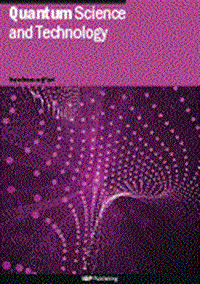用于求解参数 PDE 的量子傅立叶网络
IF 5.6
2区 物理与天体物理
Q1 PHYSICS, MULTIDISCIPLINARY
引用次数: 0
摘要
许多现实世界的问题,如环境动力学建模、物理过程建模、时间序列建模等,都涉及求解以特定条件为参数的偏微分方程(PDE)。最近,一种名为傅立叶神经算子(FNO)的深度学习架构被证明能够在输入任何初始条件的情况下学习给定偏微分方程族的解。然而,它在测试时的时间复杂度与 PDE 的评估次数成线性关系。鉴于量子硬件的进步和量子机器学习方法的最新成果,我们利用它们提供的运行效率,提出了受经典 FNO 启发的量子算法,其时间复杂度与评估次数成对数关系,预计将大大快于经典算法。这些算法的核心是使用一元编码范式和正交量子层,并在一元基础上引入新的量子傅立叶变换。我们提出了三种不同的量子电路来执行量子 FNO。这些建议在深度和与经典 FNO 的相似性方面各不相同。我们还在三个 PDE 系列(即伯格斯方程、达西流动方程和纳维-斯托克斯方程)上对我们提出的算法进行了基准测试。结果表明,我们的量子方法与经典 FNO 的性能相当。我们还对小规模图像分类任务进行了分析,在这些任务中,我们提出的算法与经典卷积神经网络的性能相当,证明了它们在其他领域的适用性。本文章由计算机程序翻译,如有差异,请以英文原文为准。
Quantum Fourier networks for solving parametric PDEs
Many real-world problems, like modelling environment dynamics, physical processes, time series etc involve solving partial differential equations (PDEs) parameterised by problem-specific conditions. Recently, a deep learning architecture called Fourier neural operator (FNO) proved to be capable of learning solutions of given PDE families for any initial conditions as input. However, it results in a time complexity linear in the number of evaluations of the PDEs while testing. Given the advancements in quantum hardware and the recent results in quantum machine learning methods, we exploit the running efficiency offered by these and propose quantum algorithms inspired by the classical FNO, which result in time complexity logarithmic in the number of evaluations and are expected to be substantially faster than their classical counterpart. At their core, we use the unary encoding paradigm and orthogonal quantum layers and introduce a new quantum Fourier transform in the unary basis. We propose three different quantum circuits to perform a quantum FNO. The proposals differ in their depth and their similarity to the classical FNO. We also benchmark our proposed algorithms on three PDE families, namely Burgers’ equation, Darcy’s flow equation and the Navier–Stokes equation. The results show that our quantum methods are comparable in performance to the classical FNO. We also perform an analysis on small-scale image classification tasks where our proposed algorithms are at par with the performance of classical convolutional neural networks, proving their applicability to other domains as well.
求助全文
通过发布文献求助,成功后即可免费获取论文全文。
去求助
来源期刊

Quantum Science and Technology
Materials Science-Materials Science (miscellaneous)
CiteScore
11.20
自引率
3.00%
发文量
133
期刊介绍:
Driven by advances in technology and experimental capability, the last decade has seen the emergence of quantum technology: a new praxis for controlling the quantum world. It is now possible to engineer complex, multi-component systems that merge the once distinct fields of quantum optics and condensed matter physics.
Quantum Science and Technology is a new multidisciplinary, electronic-only journal, devoted to publishing research of the highest quality and impact covering theoretical and experimental advances in the fundamental science and application of all quantum-enabled technologies.
 求助内容:
求助内容: 应助结果提醒方式:
应助结果提醒方式:


